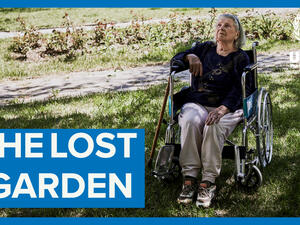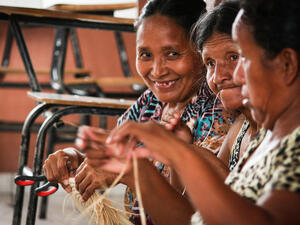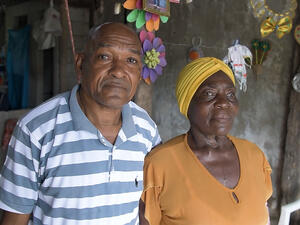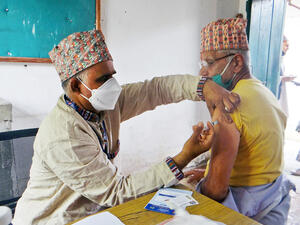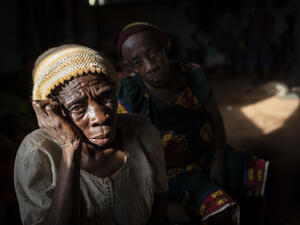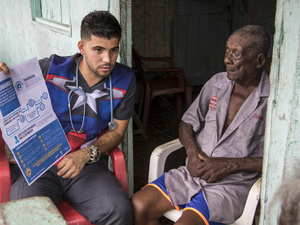Sudanese septuagenarian reunited with family after 57 years
Sudanese septuagenarian reunited with family after 57 years
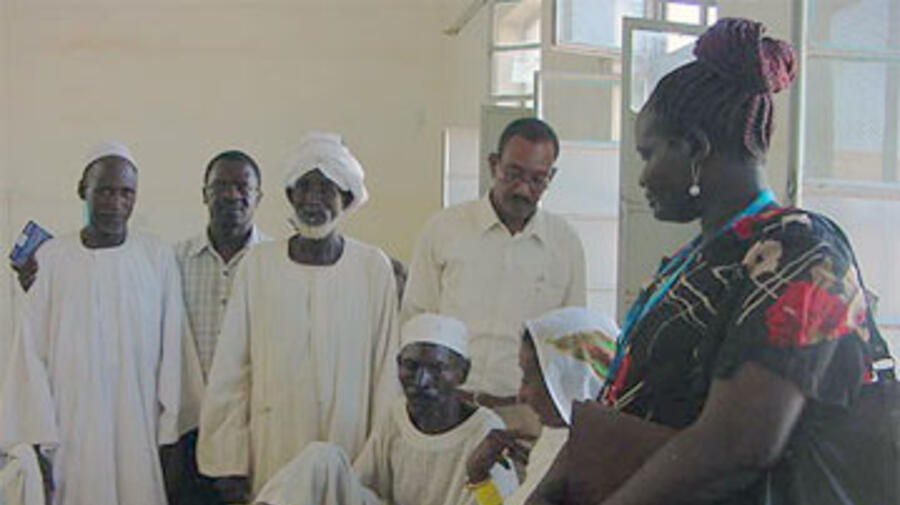
In a Khartoum hospital, Mohamed Ahmed Jamil Musa chats with brother Adam (standing, in turban) and UNHCR staff who helped reunite them.
KHARTOUM, Sudan, December 26 (UNHCR) - On a recent hot afternoon, Mohamed Ahmed Jamil Musa's dream came true - he was reunited with his brother and sister after more than half a century.
There were plenty of tears, hugs and news to exchange during the reunion in the men's ward of Khartoum North Hospital, where the Sudanese septuagenarian was a patient. His family had not seen him in 57 years and thought he was dead. "We all had mourned him after we lost contact with him. We had lost all hope of ever hearing from him again," said one of his brothers, Adam Ahmed Jamil Musa.
The unlikely meeting with Adam and sister Aicha was made possible by UNHCR, which managed to track down 76-year-old Mohamed's family from snippets of information that the former refugee was able to recall from his fading memory. The detective work began in last June, when Mohamed returned to Sudan from Isiro in the Democratic Republic of the Congo (DRC) after years in exile.
Staff in Khartoum and Juba, where Mohamed spent five months after arrival on a UNHCR convoy, found out that he hailed from Umm Sangor village in central Sudan's Al Obeid region, but went to Khartoum in 1950 and earned a living as a construction worker. In the mid-1960s, he moved to Kaya in South Sudan and became involved in agricultural trading.
When civil war erupted in South Sudan in 1983, Mohamed fled across the border to the DRC town of Isiro. He worked as a clothes trader shuttling between DRC and Uganda, but it was a struggle to make ends meet - especially as he grew older. Mohamed had three wives by this time, but no children.
He decided to return earlier this year and start the search for his family with the help of UNHCR, which solves an average of four family reunification cases a month in Sudan. The refugee agency ended its Sudan repatriation programme from DRC in June and Mohamed rode to Juba on one of the last convoys.
But Mohamed's case proved particularly difficult to crack. "As time passed and the search in Juba brought no positive results, Mohamed became frustrated and implored UNHCR to move him to a mosque in Khartoum. He told us that he planned to live there on his own," said Onyekachi Madubuko, a UNHCR community services officer in Juba.
The UN refugee agency moved Mohamed to an old people's home in Khartoum instead, and later to hospital when he fell ill. "We felt that staying in Khartoum, a place familiar to him, could refresh his memory and improve his health condition," said Madubuko.
But there was no breakthrough and the trail was going cold when Salah Idris, a senior UNHCR repatriation clerk, convinced the Khartoum bureau to let him visit Al Obeid in mid-November.
It was a long and arduous trip from remote village to remote village, up and down the mountains and across the arid landscape looking for the chief of Mohamed's tribe. He finally found the man and was told that Mohamed's family might have resettled 1,000 kilometres away in eastern Sudan.
The hunch proved to be correct and within a week Mohamed's brother, Adam, presented himself at the UNHCR office in Khartoum. "When I showed him the photo he stayed calm, but I felt that the man was trying to hold back a volcano of mixed feelings. I left my office and the man suddenly started crying. It was a very emotional moment," said Idris.
Back at the hospital, Adam said he had immediately recognized his brother from the photo. "I recognized him from the tattoo on his forehead. We have these tattoos in our tribe," he said. "We make it in the front and the back of the head. But when I saw the nationality document I was assured that it was my brother."
As he spoke, Adam turned to Idris and then thanked him and UNHCR for making the reunification possible. "To find our family, he went to places I would never go to, even if I was given money for it," the grateful brother said.
Mohamed's tale demonstrates that persistence pays off. "Family reunification is one of UNHCR's protection principles," said Chris Ache, UNHCR's representative in Sudan. "It is therefore very important for us to help trace relatives of returning refugees who have completely lost contact with their loved ones because of war."
UNHCR assisted more than 8,000 Sudanese refugees like Mohamed to return home from DRC under an operation launched last year and completed in June. Since the signing of a peace agreement in January 2005 between the central government and the Sudan People's Liberation Movement/Army, more than 162,000 Sudanese refugees have returned home, including some 70,000 with UNHCR assistance. In 2008, UNHCR plans to aid the return of a further 80,000 Sudanese refugees from neighbouring countries.
By Ayman Elsir in Khartoum, Sudan


